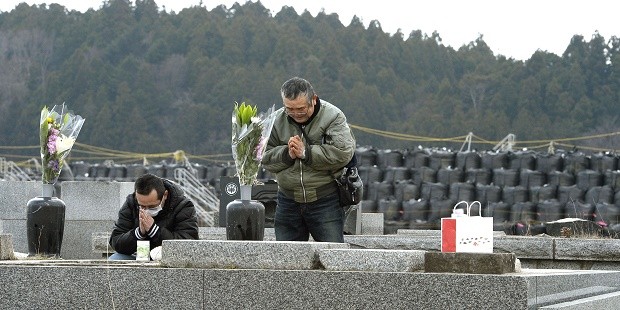Japan marking 5th anniversary of devastating tsunami

People pray in front of ancestors’ grave as black plastic bags containing radiation contaminated waste are piled in the background, in Futaba, Fukushima prefecture, northern Japan Friday, March 11, 2016. Japan on Friday marked the fifth anniversary of the 2011 tsunami that killed more than 18,000 people and left a devastated coastline along the country’s northeast that has still not been fully rebuild. AP
MINAMISANRIKU, Japan — Japan on Friday marked the fifth anniversary of the 2011 tsunami that killed more than 18,000 people and left a devastated coastline along the country’s northeast that has still not been fully rebuilt.
In the town of Minamisanriku, a handful of tourists offered prayers in the morning at the skeletal remains of the former disaster prevention center, where 43 workers died as tsunami waves engulfed the three-story building.
Much of the Tohoku coast remains empty except for mounds of dirt brought in to raise the ground level to minimize risks from future tsunamis before any rebuilding is done.
Nobuhito Akima, a businessman visiting for the first time from Tokyo, said the vast lands seem almost too clean. “I don’t intend to say what’s right or wrong regarding the reconstruction, but I also feel like I can’t really tell where all this reconstruction is heading,” he said.
Masaki Kamei, a doctor from Tokyo who has been visiting disaster-hit areas every year, senses life is coming back.
Article continues after this advertisement“What’s different this year compared to last year is fishermen have already gone out fishing by dawn … and towns are already bustling about going on with their business,” he said. “There is an expression: the hammering sound of reconstruction. That’s how I feel, I sense the emphasis has shifted.”
Article continues after this advertisementREAD: Fukushima mistakes linger as Japan marks 5th anniversary
On the eve of the anniversary, Prime Minister Shinzo Abe pledged to bolster reconstruction efforts ahead of the 2020 Tokyo Olympic Games.
He promised to rush decontamination work in irradiated areas near the tsunami-wrecked Fukushima nuclear plant to allow more residents to return home safely. He also set ambitious goals to reopen a damaged coastal railway in Fukushima by 2020 and triple tourism in the north.
“We plan to secure an ample budget to launch support measures to help disaster-hit areas stand on their feet again,” Abe said.
He pledged to reopen the Joban railway line, part of which is in the highly contaminated no-go zone near the nuclear plant, by March 2020, just months before that summer’s Olympics in Tokyo.
Residents of disaster-hit regions have criticized the government for rushing the reconstruction to showcase Fukushima’s safety for the Olympics rather than for the residents.
The government hopes to reopen all evacuation zones by next March, except for the dangerously contaminated surroundings of the plant.
Abe said he also wants to triple the number of foreign visitors to the Tohoku region to 1.5 million in 2020 so that tourists can see the reconstruction “through their own eyes.”
READ: Japan still searching for the missing, 5 years after tsunami